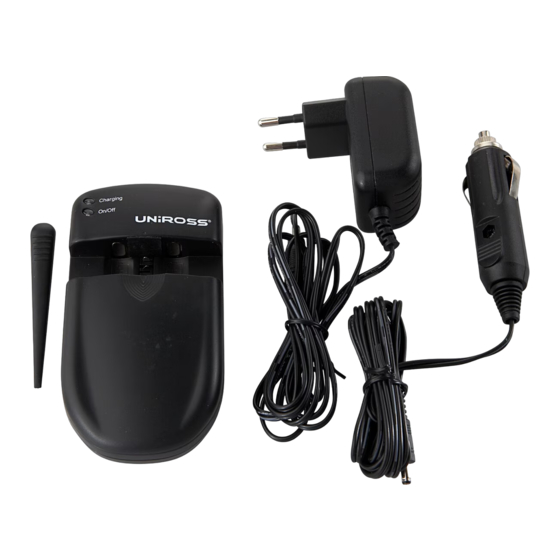Clas Ohlson 38-3027 Skrócona instrukcja obsługi
Przeglądaj online lub pobierz pdf Skrócona instrukcja obsługi dla Ładowarka Clas Ohlson 38-3027. Clas Ohlson 38-3027 4 stron. Digital camera battery charger

38-3027
Digital Camera Battery Charger
Safety
Only insert rechargeable batteries into the charger. Never try to
recharge non-rechargeable batteries.
Do not mix batteries of different sizes, chemical compositions or
capacities in the charger at the same time.
The charger is for indoor use only.
Do not expose the charger to high temperatures or humidity and
keep the charger away from moisture of any kind.
This charger should only be used by adults and should be kept out
of reach of children.
Do not attempt to open the charger. Repairs must only be carried
out by an authorised service centre.
Always disconnect the charger when it is not in use.
Never use an extension lead or any accessory not recommended
by the manufacturer. This could result in fires, electric shocks or
personal injury.
Batteries contain environmentally dangerous chemicals. Unwanted
batteries should therefore be taken to recycling centre and not
thrown into the rubbish bin.
Description
A. Green LED indicates that
charging is in progress.
B. Red LED indicates that the
charger is turned on.
C. Sliding cover.
D. Connector +/- for Li-Ion
battery pack.
E. Place for Ni-MH and Ni-Cd batteries.
F. Power adaptor socket.
G. Plastic pin for adjusting the position of the +/- contacts on the
charger.
GREAT BRITAIN For consumer contact, please visit www.clasohlson.co.uk and click on customer service.
ENGLISH
Use
1. Connecting the charger
Connect the adaptor to the power supply and to the charger. If the
charger is to be run on 12 V, first connect the adaptor to the 12 V
socket and then connect it to the charger. The red LED indicates
that the charger is receiving power.
2. Inserting batteries: 2 alternatives
2.1 Li-Ion batteries
•
Remove the clear insert from the charger before charging
batteries.
•
Adjust the spacing of the contacts so that they line up with the
positive and negative poles of the battery.
•
The battery should be placed vertically or horizontally depending
on the polarity of the charger.
•
Carefully release the sliding cover to lock the battery into position.
2.2 Rechargeable Ni-MH and Ni-Cd batteries
•
Only recharge batteries of the same size (AA or AAA) and same
type (Ni-MH or Ni-Cd).
•
Fully open the sliding cover.
•
Insert batteries in accordance with the +/- indicated on the charger.
•
Carefully release the sliding cover to lock the battery into position.
3. Charging position
Charging begins as soon as the battery pack or rechargeable bat-
teries are in the correct position. When charging begins, the green
LED starts to flash. When the charging is complete, the green LED
is steady.
Troubleshooting
None of the LEDs
The charger is not properly connected.
lights
The green LED comes
The battery is not connected correctly. If
on when the battery is
the battery has two ways of connecting
inserted and the char-
it, try the other way until the green LED
ger is connected to a
starts to flash and the battery starts being
power supply.
charged.
Both LEDs flash
The polarity of the batteries is reversed.
The battery is faulty or non-rechargeable.
Specifications
Adaptor:
Power supply:
110-240 V AC or car adaptor 12 V DC.
Output voltage:
12 V DC, 650 mA
Charger:
Power supply:
12 V DC, 650 mA
Charging voltage:
Li-Ion: 4.2 V DC / 8.4 V DC
Ni-MH, Ni-Cd: 1.4 V DC, 650 mA
Maintenance charging: -∆V, timer 8 h 30 min
According to the European WEEE Directive 2002/96/CE, this prod-
uct is classed as an item of electrical and electronic equipment that
must be sorted and recycled. It is marked with the selective sorting
symbol. This means that it may not be discarded together with other
household refuse but must be returned to your local municipal col-
lection point for recycling. It will then be sent to an approved centre
which will reuse and recycle its constituent parts, whilst neutralising
any possible substances harmful to health or the environment. By
participating in separate waste collection you are helping to reduce
the wastage of our natural resources.
